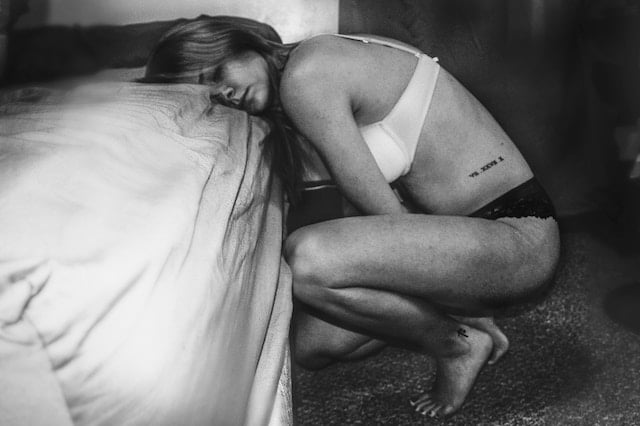I’ve started to wonder what it might be like for people who have never experienced depression.
Or have we all had this feeling, the heavy weight of emotion that cannot be shaken, where isolation feels like the only option?
The first time I felt this way was in elementary school. I can’t quite remember all the details, but I remember the sensations so clearly—not wanting to see any of my friends and feeling like I was faking my happy smile day after day. It was as if my existence had a default setting: heavy-hearted and unexplainable sadness.
If you have never experienced any form of depression, I sincerely hope that remains one of your life’s blessings.
I’ve experienced it many times, and each time, it is deeper and harder to climb out of. When we are young, our worlds are smaller, our problems resulting in less depth. When we grow, our world becomes more complex—and therefore, our struggles seem to weigh more.
This fall, I fell hard into the darkness of depression. The past summer had been so bright: illuminated with great joy and memories to last a lifetime. I had a budding successful business, new lovers, new friendships, and some of the greatest lessons life has provided me with yet.
And then, the fall came, and with it came intense contrast to the highs of spring and summer. Death in the family, mold in my home, dysfunctional communication with some of my closest friends. Suddenly depression enveloped my whole being.
Lethargy kicked in, and getting out of bed seemed like running a marathon; my stomach was inflamed, and quite honestly, I looked like I was about six-months pregnant. It was the “off season” for my start-up business, and I had lots of time to think. I had come home from sunny California to a grey Vancouver. Vitamin D levels were low, and my family and home life were littered with uncomfortable situations. Soon, I lost all energy to communicate with those who I loved, and happy people…they were unbearable.
If you are one of those seriously lucky people who don’t know this kind of disease, think as if someone has given you a heavy, wet, stinky blanket and wrapped it around you. The damp, heavy fabric convolutes each thought—each waking moments feels like a struggle because you’re carrying around a wet blanket. I don’t know if I felt guilty, but inadequacy and dejection were rampant.
There is often no one reason that a person becomes depressed; it is more of a syndrome—a myriad of symptoms and causes that are so overwhelming it is hard to know where to start when we try to untangle our emotions. I remember some days, sitting in my car as it rained and feeling like my heart was so heavy that it was beating slower than it should, tears waiting behind my eyes just wishing something would trigger me so they could release and meet with the drops of the rain. I felt judged by everyone, but of course, I was my own worst critic. I pulled the wet blanket over myself and acted like someone else had given it to me.
Depression is an ugly, clinical, and terrifying disease. It is not just a bad mood, it is a result of overwhelming imbalance—chemical imbalances in the brain/gut combined with an overwhelming sense of purposelessness. Depression is like any other disease or sickness in that we cannot make our diagnosis disappear in a day. Those weeks or months can feel like a giant setback in our once successful life trajectory.
In reflection from my most recent fall, I have come up with my top tips on how to halt the overwhelming downward inertia of depression.
Don’t pretend everything is okay. When people ask “How are you?” respond with honesty: “I feel like sh*t I’m having a really hard time, and I don’t feel like myself—I feel lost and confused.” No doubt, I had conversations cut shorter than usual, but the people who care will be there to listen—and most importantly, you won’t know who those people are unless you tell the truth. It is okay to not be okay.
Do what you know works. Start with the basic survival essentials and focus on those. Let’s not expect ourselves to climb Mount Everest, when getting out of bed is a struggle. It’s just cruel and unrealistic. Simplify your priorities: eat well, sleep well, and get your biology in check. Take Vitamin D if you live somewhere without sunshine, go for short walks instead of trying to go to the gym, and make small goals like writing a gratitude list each day, getting out of bed, and showering each day. Practice child’s pose, not handstands.
“Write long and hard about what hurts.” ~ Ernest Hemingway. Journal and reflect. Depression causes time to slow down, so just go slow and ride it out, but don’t hold onto it. Put pen to paper (or fingertips to the keyboard) and then reflect on what hurts. Slowly but surely, the pieces will start to fall into place again. Most likely, they will not be put back into the same place, because that place you were at before depression set in is probably not somewhere you want to go back to.
When something—anything—inspires you again, and follow that light like a bee sensing the pollen of a perfect flower. Whatever small thing brightens your day, give gratitude for that sensation of joy it creates, savour it, and do it again the next day. Focus on the good things and the good things will grow.
Be patient. Be compassionate and know that it is okay to ignore your happy friends for a little while, especially if they have never felt depression.
Get a good probiotic and eat sauerkraut every day. Gut imbalance will make it a lot harder to bounce back from depression. Our microbiome is a powerful force, and if we aren’t feeding the good bacteria, the bad guys will multiply at exponential rates. A healthy and balanced gut flora, allows for a healthy and balanced mind.
Delete social media for a few weeks. Pause the comparison parade and focus on your connection to the earth. Google the science behind “grounding” and get outside, take your shoes off or jump in a cold body of water. (Seriously, I started to jump in the cold Canadian river near my house almost every day in November! That will snap you back into motion.)
Unleash your emotions without judgement. Know that emotions are energy in motion; if they are stuck in our body (or head) because we are too self-judgmental to let them out, or we fear we will hurt someone else, it will keep hurting. Just focus on honest and compassionate communication with yourself and others. Go forth and be human.
Finally, if D is for Depression, then C is for Community. We are here to be reflections for each other. Someone in your life will be able to relate to your pain, and that will be the thing that keeps your head floating above water—knowing that you are not alone. This is the hardest one, because we naturally want to isolate ourselves during depression, but just talking to anyone—even if the thing you have in common is that you feel like absolute crap—can bring you back into balance without you even noticing.
Community can also come in the form of an unbiased support system, for example, a professional counsellor or a help-line. Talking to someone who is able to give you a relationship that does not need nourishment from your end (that person is there for your needs and your needs alone, they don’t need anything from you in return—except maybe money) will allow you space and to process what you are going through. No strings attached.
Facing our feelings is the only way to move through them; community and connection with others allows you the safe space needed to approach our dark self and remember the light that lives within. When we go searching in the dark without a flashlight, why wouldn’t we use the buddy system?
~
Relephant:
~
Jim Carrey explains Depression in the Best Way I’ve ever Heard.
Author: Chloe Devine
Image: Sydney Sims / Unsplash
Editor: Sara Kärpänen
Copy editor: Yoli Ramazzina







Read 0 comments and reply